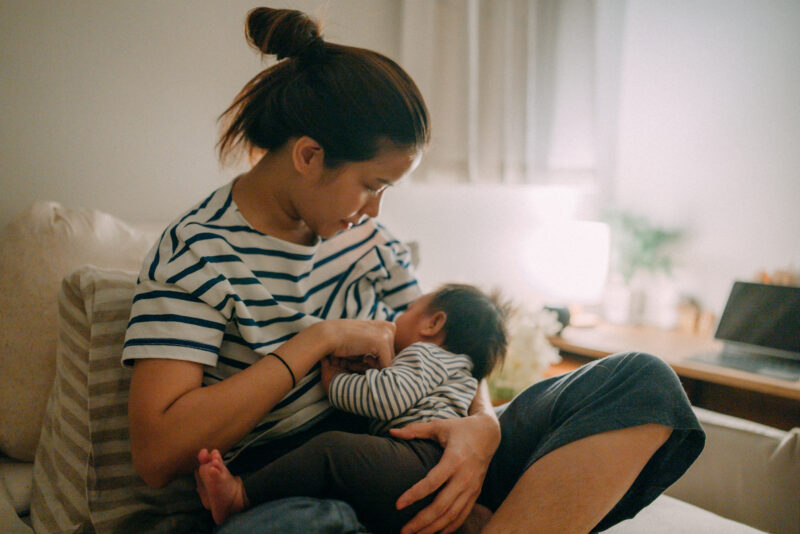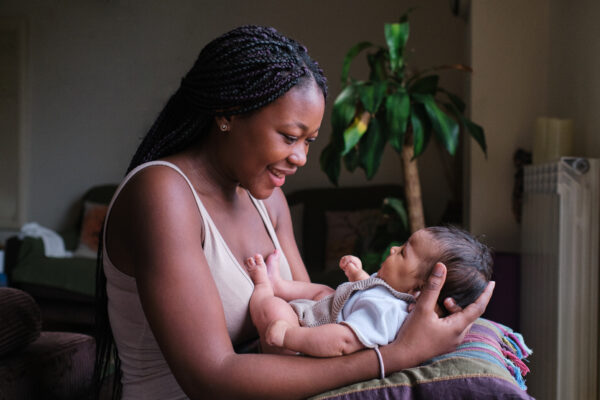 When you’re expecting, it’s rather clear what you can and cannot eat or drink, but when it comes to breastfeeding, many moms have their fair share of questions. Should I avoid the same foods I did while pregnant? Can I have an occasional drink? Should I eat more than normal?
When you’re expecting, it’s rather clear what you can and cannot eat or drink, but when it comes to breastfeeding, many moms have their fair share of questions. Should I avoid the same foods I did while pregnant? Can I have an occasional drink? Should I eat more than normal?
Whether you’re a new mom or a seasoned parenting pro, breastfeeding nutrition can be confusing. Carly Dulabon, MD, director of breastfeeding medicine at Akron Children’s, answers some common questions moms have about how their diet might affect their breast milk and baby.
Do I have to continue a healthy diet and take prenatal vitamins?
Just as when you were pregnant, it’s important to eat a healthy and diverse diet while you’re breastfeeding. Eating plenty of wholesome fruits, vegetables, whole grains, protein and calcium-rich foods fuels milk production and gives your baby a nutritious diet. Plus, eating a varied diet changes the flavor of your breast milk and exposes baby to different tastes.
You need an estimated 300 to 500 extra calories per day as a breastfeeding mother. Breastfeeding also might make you thirsty, so consider keeping a water bottle nearby so it’s there when you need it.
“It’s no longer recommended or required to take a prenatal vitamin during lactation. Moms get enough nutrients from eating a well-balanced diet to maintain optimal health,” said Dr. Dulabon. “However, if mom has diet restrictions, such as eating vegan or dairy-free, supplements may be recommended. It also may be beneficial to take an iron supplement if mom has a history of anemia.”
Should I still avoid some types of fish?
Fish is an excellent source of protein and omega-3 fatty acids. But just like during pregnancy, nursing moms should avoid or limit their intake of fish high in mercury, including swordfish, shark, king mackerel and bigeye tuna. High mercury levels can damage a baby’s developing nervous system.

Not drinking alcohol is the safest option for breastfeeding moms. But if you do have one drink, Dr. Dulabon recommends waiting 2 to 3 hours to nurse or pump so there is less alcohol in your breast milk.
How do I know if my baby has an allergy to something in my diet?
A breastfed baby may have an allergy or sensitivity reaction after the mother consumes certain foods or drinks (such as common food allergens like cow’s milk, soy, wheat, eggs, nuts and peanuts, fish or shellfish).
Signs of your baby having such a reaction to food can include:
- Frequent spitting up or vomiting
- Apparent belly pain (lots of gas and/or pulling up the knees in pain)
- Bloody, mucousy stools
- Hard stools
- Rash and swelling
If you think your baby has had a reaction to food, call your doctor and avoid eating or drinking anything your little one can’t seem to tolerate.
“If your baby has difficulty with feeding, try to keep a journal of exactly what you eat and drink, along with any reactions your baby had,” advised Dr. Dulabon. “It will help both you and your doctor pinpoint what the problem food, or foods, might be.”
Although such a reaction is extremely rare, if your baby has trouble breathing or has swelling of the face, call 9-1-1.
Is it safe to have a drink occasionally?
Not drinking alcohol is the safest option for breastfeeding mothers. However, there is no evidence to support drinking in moderation — having up to 1 drink within a 24-hour period — is harmful for your baby. One standard drink is defined as 12 oz. of beer, 5 oz. of wine or 1.5 oz. of liquor.
Alcohol does pass into breast milk, and the alcohol level in breast milk is essentially the same as the alcohol level in mom’s bloodstream. As your blood alcohol level falls over time, the level of alcohol in your breast milk also decreases.
“It’s recommended mothers wait about 2 to 3 hours after a single drink to nurse or pump so there is less alcohol in their breast milk,” said Dr. Dulabon. “It’s also a good idea to drink the beverage over the course of an hour to keep alcohol peak levels low in breast milk.”
While drinking in moderation is safe for baby, drinking to excess when nursing is not. Drinking above moderate levels can negatively affect baby’s growth, development and sleeping patterns. It’s also a risk factor for SIDS (Sudden Infant Death Syndrome).
What’s more, drinking too much can affect how you care for your baby and may prevent you from responding to your baby’s needs appropriately, since it alters your ability to be alert and think clearly.
Can I have caffeine?
As with alcohol, it’s best to limit the amount of caffeine you consume while breastfeeding. It is recommended moms limit caffeine to 3 cups, or 300 milligrams of caffeine from all sources, daily. However, if your baby isn’t sleeping well or is irritable, you may want to limit or avoid caffeine.
“Contrary to popular belief, dietary restrictions during pregnancy do not apply to breastfeeding moms. The rules are much more relaxed when nursing,” said Dr. Dulabon. “Just focus on making healthy choices and you and baby will reap the rewards.”
Learn more about breastfeeding medicine. To schedule an appointment, call 330-543-4500.











